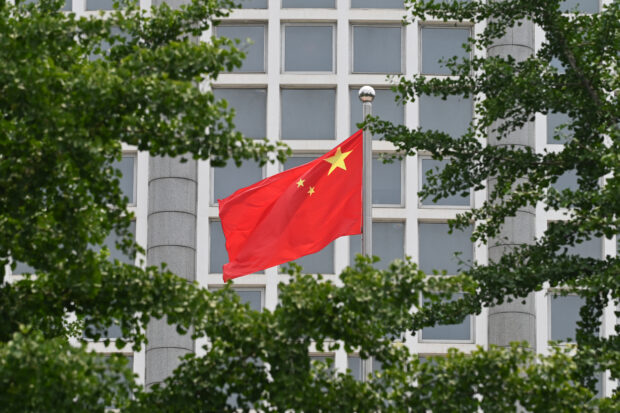
GREG BAKER/AFP
BERLIN, Germany — Germany and Britain on Monday both swooped on suspected spies accused of passing on secret information to China, as concern deepens in the West over aggressive Chinese espionage.
In Germany, investigators arrested three German nationals in the west of the country suspected of sharing information on maritime technology, prosecutors said in a statement.
The trio, named as Herwig F., Ina F. and Thomas R., are accused of taking part in an information-gathering project funded by Chinese state agencies, as well as illegally exporting a laser to China.
READ: Chinese in PCG reserve force ‘not spies, hackers’
China’s embassy in Berlin “firmly” rejected the allegations, according to state-run news agency Xinhua.
“We call on the German side to stop exploiting the espionage allegation in order to politically manipulate the image of China and defame China,” said the embassy in a statement sent to Xinhua.
READ: Calls grow to probe Chinese influx as national security issue
Repeated warnings
In Britain, two men were charged with handing over “articles, notes, documents or information” to China between 2021 and last year.
Police named the men as Christopher Berry, 32, and Christoper Cash, 29, who previously worked at the UK parliament as a researcher.
The suspects are accused of breaking the Official Secrets Act 1911 and are due to appear in a London court.
The German arrests and British charges come amid repeated Western warnings of Chinese intelligence services targeting advanced technologies.
German Interior Minister Nancy Faeser warned of the “considerable danger posed by Chinese espionage in business, industry and science.”
“The area affected in the current case—innovative technologies from Germany that can be used for military purposes—is particularly sensitive,” Faeser said.
‘Very extensive business’
Germany’s first national security strategy, unveiled last year, was noticeably tough on China and accused Beijing of repeatedly acting against Berlin’s interests.
In its 2023 annual report, the German military’s counter-intelligence service (MAD) also warned against potential espionage as China seeks to become a technological world leader by 2049.
In particular, it mentioned joint projects with the German armed forces as a major risk.
German domestic intelligence chief Thomas Haldenwang on Monday said the security authorities were “very vigilant” on the issue of Chinese espionage.
Although he did not want to call the latest case the “tip of the iceberg,” Haldenwang said it was “certainly part of a very extensive business.”
Military purposes
One of the suspects in the German case, Thomas R., is accused of working as an agent for an employee of the Chinese ministry of state security (MSS).
He is said to have established contact with Herwig F. and his wife Ina F., who ran a company in Duesseldorf with expertise in technologies that could be used for military purposes.
The company allegedly signed an agreement with a German university to prepare a study for a Chinese “contractual partner” on state-of-the-art machine parts used in powerful ship engines.
Maritime combat capabilities
The contractual partner was the MSS employee that Thomas R. was working for and the project was financed by Chinese state agencies, according to prosecutors.
At the time of their arrest, the suspects were also allegedly in further negotiations about research projects that could be useful for the expansion of China’s maritime combat capabilities.
Besides accusing Beijing of using espionage to gather technological information, Western nations have also accused hacking groups backed by China of a global campaign of cyberespionage targeting critics.
Cyber groups
In March, the United States, Britain and New Zealand accused Beijing-backed cyber groups of being behind a series of attacks against lawmakers and key democratic institutions—allegations that prompted angry Chinese denials.
In Britain, the Commons intelligence and security committee last year claimed China was targeting the country “prolifically and aggressively” and that the government did not have the “resources, expertise or knowledge” to deal with it.
Domestic intelligence service MI5 last year warned that a Chinese government agent called Christine Lee had been “engaged in political interference activities on behalf of the Chinese Communist Party, engaging with members here at parliament.” —AGENCE FRANCE-PRESSE